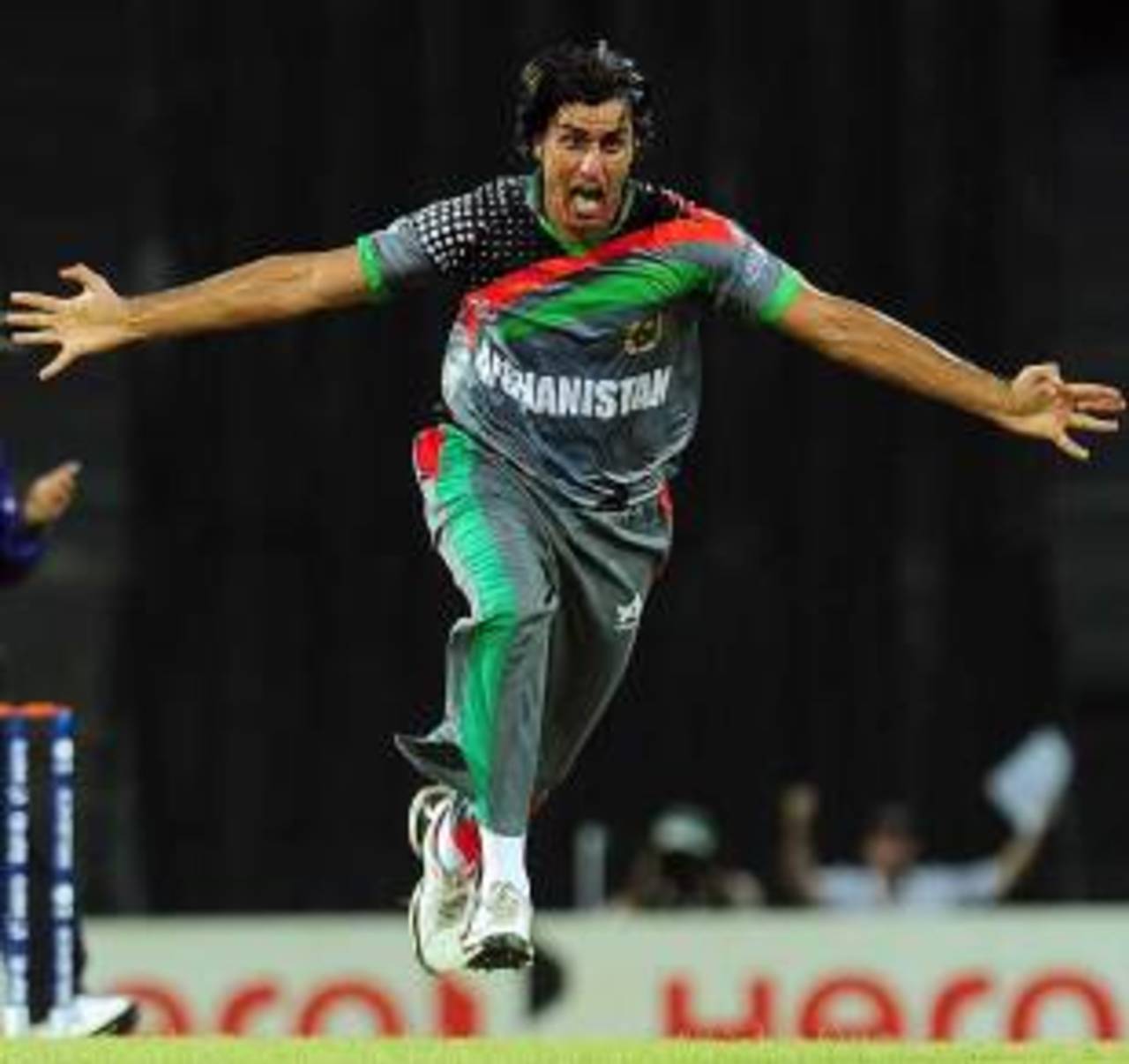Emergence of new markets with T20 leagues
Tristan Lavalette's piece on cricket in Serbia reminded me once again, that cricket is not yet a truly global sport, but it has great potential to become one
Samir Chopra
Feb 25, 2013, 11:36 PM

One Afghani player in the IPL could lift cricket in his benighted country from the level of curiosity to that of street-level passion • AFP
Tristan Lavalette's piece last week on cricket in Serbia reminded me once again, that cricket is not yet a truly global sport, but it has great potential to become one. And a very important feature of the Twenty20 world has a great deal to do with that promise: the fact that clubs, not nations, can form the basis of an international league, and as such a new labour market can emerge, one made up of players not resigned to waiting for their country to make it big before they can.
In modern international cricket, nations rule the roost. If your country is an Associate, not Full, Member of the ICC, your chances of playing top-class competitive cricket and earning a living wage are considerably diminished. But things aren't so good even for the Full Members. If your country has already picked its national eleven, you are out on the sidelines. And the salary schedules in international cricket taper off very sharply: plenty at the top, little below. The international cricket league--indeed, whether T20 or 50-50, or well, in my wildest dreams, Tests--could offer these players a chance to compete against the best and make a career out of cricket. They will not be up against the glass ceiling. The Twenty20 league has caused much disruption in world cricket to established cricketing nations; it is worth remembering it can do much good to cricket's current poor cousins, the Associate nations and the journeymen cricketers from the Full Members.
In my new book Brave New Pitch: The Evolution of Modern Cricket, in a section titled 'The World Labour Market' I wrote:
In general, Twenty20 leagues, delinked from any larger mission to produce a 'national team', demonstrate the potential for a world labour market to emerge in professional cricket players; they promise a livelihood to players who might never have entertained dreams of a professional career, especially if that career was premised on international cricket arranged by a national board through the ICC.
A straightforward and not implausible effect of this could be a promotion of the game worldwide that the ICC has been unable to bring about, and sometimes, as its dealings with Associate Members shows, seems uninterested in. Ryan Ten Doeschate has already demonstrated that Associate Members can supply players to the IPL; the Irish 'O Brien brothers, Kevin and Niall, raised hopes--ultimately dashed--of IPL contracts based on their 2011 World Cup performances; the Canadian Hiral Patel, who smashed a six off Shaun Tait in the 2011 World Cup, should have jolted a check loose from an IPL auction buyer as well; his presence in the 2012 IPL would have been a bigger boost for Canadian-- and possibly Gujarati--cricket than any ICC-sponsored initiative so far.
Most intriguingly, it is entirely plausible that one Afghani player in the IPL could lift cricket in his benighted country from the level of curiosity to that of street-level passion. While IPL franchises remain fixated on Indian players and more established international players, the presence of several players from the ICC's Associate Members--such as Alex Kervezee (the Netherlands), Kyle Coetzer (Scotland), Rizwan Cheema (Canada), Niall O'Brien (Ireland), Hamid Hassan (Afghanistan) and Freddie Klocker (Denmark)--in the 2012 Bangladesh Premier League (BPL) showed that such a movement of players and possible global development of the game could get underway in Twenty20 leagues. (The BPL requires each of its six franchises to buy at least one player from an Associate country.)37 For the time being, these players will hope for promotion to the IPL, but if other Twenty20 leagues take hold worldwide, they might find employment elsewhere as well. …
In cricket, national origin still makes a difference, and the tolerance for the globe-trotting professional is a little low. In contrast, cries of 'foreigner' do not arise quite as often when a non-native represents a country in other domains; an Indian-American doctor who carries a US passport after naturalization and represents the US at the annual conference of the Red Cross is quite straightforwardly an American. For a true world labour market in cricket to emerge, cricket leagues would have to be freed from any imperative to produce a strong national team. The global structure of cricket would have to evolve away from the current primacy of international cricket created by the arrangements of the ICC and its constituent national boards.
The IPL, the Champions League, the BBL and the BPL show how this may occur in the not-too-distant future. Currently, thanks to the IPL and Champions League, which make it possible for a player to play for different sides during different competitions, the outlines of a world labour market made up of players not beholden to any nation are visible and highly suggestive. Worries about the motivations of potentially conflicted players--torn between their state sides and their IPL franchises when they play in the Champions League--arise precisely because of the conflict between 'home' and elsewhere. these would not be raised if the nativist link between them and their 'home state' was severed. As professionals, the players should perform as well as they can; they would not owe their domestic sides any more than what any employee might owe his former employer.
Samir Chopra lives in Brooklyn and teaches Philosophy at the City University of New York. He tweets here